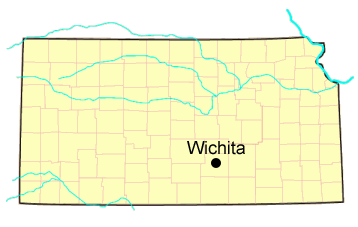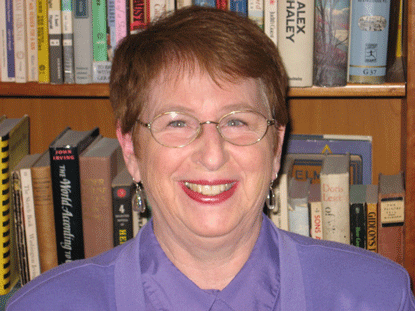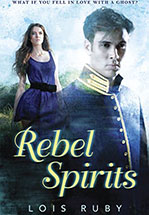

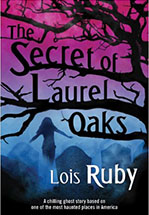
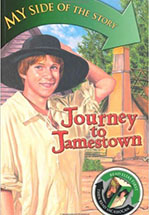
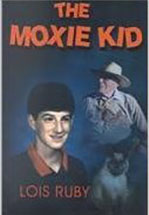
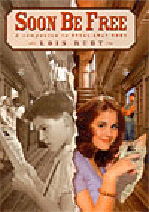
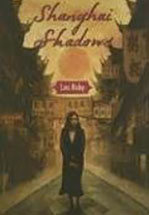
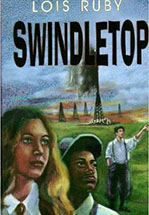
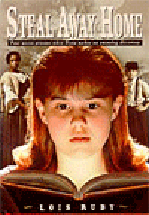
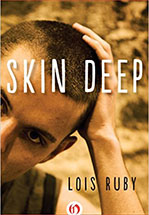
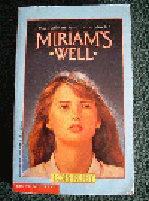
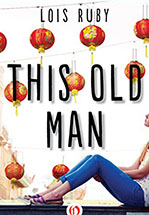
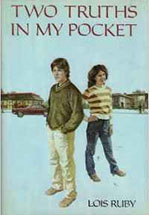
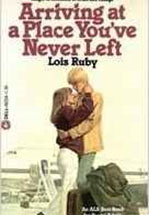
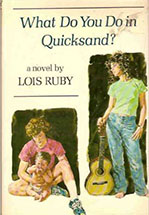
|
| Biography |
|
| |
Lois Ruby sneaked in the back door as a writer for young people. That is, she was a Young Adult librarian for the Dallas Public Library, and after reading a thousand or so books in her department, she decided she could write the stories herself. Why not? Her first book was published in 1977. Since then, fourteen more have seen print, and she’s no longer a working librarian. Instead, her time is divided among her family, research, writing, and visiting schools to energize children and teenagers about the joys of reading and the ideas in books for young readers.
Lois shares her life with her psychologist husband of 46 years, Dr. Tom Ruby, and their three sons, daughters-in-law, and five brillaint grandchildren. Lois was raised in California and seasoned in Texas and Kansas (which she considers home). She lived in Wichita, Kansas, for 30 years, raising her children and publishing her first 11 books there. Lois succumbed to the enchantment of New Mexico’s ever-changing mountains and resettled in Albuquerque. She loves writing and gets lost for days in the library or her office, where her husband checks in every so often to make sure she’s still breathing. Her latest book, Strike! Mother Jones and the Colorado Coal Field War, about the notorious early 20th century rabble-rouser, Mother Jones, once called “the most dangerous woman in America!," will be her initial foray into non-fiction.
When asked how long she has been writing Ms. Ruby stated, "I've pretty much been writing since first grade, when I first learned to read by the ancient method of the "Dick and Jane" books. Those primers were so awful that I decided to write my own stories with the limited vocabulary I had. And I've just kept going since then! My first book was published in 1977. My 15th will be out this year, and it's my first non-fiction title, also aimed at middle graders and teens. Next year my next teen novel will be published." Return to Top of Page |
|
|
Bibliography ( - housed in Thomas Fox Averill Kansas Studies Collection) - housed in Thomas Fox Averill Kansas Studies Collection) |
|
| |
Books:
- Rebel Spirits (Point, 2013)
- Strike! Mother Jones and The Colorado Coal Field Wars (Filter Press, 2012)
- The Secret Of Laural Oaks (Starscape Press, 2008)
- Journey To Jamestown: My Side of the Story (Kingfisher, 2005)
- The Moxie Kid (Eakin Press, 2003)
 Soon Be Free (Aladdin Paperbacks, 2002) Soon Be Free (Aladdin Paperbacks, 2002)
 Shanghai Shadows (Holiday House, 2002) Shanghai Shadows (Holiday House, 2002)
- Swindletop (Eakin Press, 2000)
 Steal Away Home
( Aladdin Historical Fiction, 1999) Steal Away Home
( Aladdin Historical Fiction, 1999)
- Skin Deep (Scholastic, 1994)
- Mirriam's Well (Scholastic, 1993)
- Pig Out Inn (Fawcett Juniper, 1988)
 This Old Man (Fawcett, 1986) This Old Man (Fawcett, 1986)
- Two Truths In My Pocket (Random House, 1983)
- Arriving At A Place You Never Left (Dell Publishing, 1980)
- What Do You Do In Quicksand (Viking Press, 1979)
Return to Top of Page |
|
|
| Awards |
|
| |
- Chair, National Book Award Panel on Literature for Young People, 2004.
- Recipient of the Professional Celebrate Literacy Award, Wichita Area Reading Council, 1996.
- Arriving at a Place You Never Left: “Best Books for Young Adults List, 1977,” by the American Library Association.
- Two Truths In My Pocket: a “Notable Children’s Trade Book in the Field of Social Studies, 1982,” by the National Council for Social Studies and the Children’s Book Council; one of “Fifty Notable Children’s Books of Jewish Interest, 1980-1984,” by the Jewish Book Council.
- Miriam's Well: “Best Books for Young Adults List, 1994,” by the American Library Association; “Books for the Teen Age, 1994,” by the New York Public Library; finalist, Juvenile Fiction Division, 1994, Society of Midland Authors; candidate for the following state awards: Sequoya Young Adult Award, 1995-1996 (OK) and Iowa Teen Award, 1997-1998.
- Skin Deep: “Books for the Teen Age, 1995,” by the New York Public Library; candidate for the Nevada Young Readers’ Award, 1998; selected for the Simon Wiesenthal Center Library, Museum of Tolerance, Los Angeles.
- Steal Away Home: a “Notable Children’s Trade Book in the Field of Social
Studies, 1995,” by the National Council for Social Studies and the Children’s Book Council; “Books for the Teen Age, 1996,” by the New York Public Library; Young Adult Choice List, 1996, by the International Reading Association.
Candidate for the following state awards:
- Charlotte Award, 1995 (NY)
- California Young Reader’s Medal, 1996-1997
- Sunshine State Award, 1996 (FL)
- William Allen White Award, 1996-1997 (KS)
- Heartland Young Adult Literature Award, 1996-1997 (KS)
- Tennessee Young Reader’s Award, 1996-1997
- Golden Sower Award (NE), 1997-1998
- Twelve Favorite Books about Kansas or by Kansas Authors, Kansas Center for the Book, 2007.
- Shanghai Shadows: a Bank Street College book of the year, 2007; a Kansas Notable Book, 2007.
- “Jubilee Year,” a short story: First prize, fiction category, 1987, Kansas Authors’ Club; honorable mention, short story competition, 1991,Writer's Digest.
Return to Top of Page
|
|
Author Interview |
|
| |
Lois Ruby is a full-time author of young adult books. She lives in Wichita with her husband and has three grown sons. She was interviewed at her home on February 25, 1997, by Linda Jones McCoy, EdD --
Linda
To get acquainted with you, I'd like to begin today with some background information about your growing up years, your early career, and what led you to Kansas.
Lois
I grew up in San Francisco with no brothers and sisters. When I was three, my father died, and shortly afterwards my mother and I lived in New York and the Dominican Republic.
My husband, Tom Ruby, and I met at Cal/Berkeley when we were still in our teens. We graduated and moved to Texas. I was the Young Adult librarian for the Dallas Public Library, which is how I got interested in books for teenagers. Twenty years ago my first book was published, but I've actually been writing as long as I've been reading.
When our boys were pre-schoolers, we came to Kansas for Tom's first job after his Ph.D. He's a clinical psychologist in private practice here in Wichita, and a really sweet guy. Our more worldly relatives say nothing ever happens in Kansas, but this state has a fascinating history and endless areas to explore in writing.
Linda
Who are the people who have had influence in your development as a writer - from childhood until now?
Lois
There were few books in my house other than the ones I brought home from the library. Librarians in those days were ogres. Still, I have my neighborhood librarian to thank for the fact that I started reading adult novels from age nine, rather than risk tiptoeing past her to the children's room. So I was exposed to good writing way before I knew about quality books for children.
Creative writing was considered a waste of time when I was in school, yet somehow I yearned to write stories - and did - for my own pleasure and to entertain my friends. My senior English comp teacher in high school taught us how to hone the perfect five paragraph essay through daily grinding practice, which we all hated. Looking back, I realize I've adapted her method to every length and type of writing, including fiction outlines. Thanks, Miss Garrett! I took one ten-week creative writing class at WSU [Wichita State University] from Ben Santos, a remarkable Philippine writer and superb teacher. My husband is my idea man and sounding board and gentle editor. Otherwise, the greatest influence comes from my writers' critique group. They don't let me get away with lazy writing.
Linda
Describe your writing process.
Lois
I have a little room in my house where I do all my work. I am surrounded by books and papers - 800 books, stacks of papers on the floor, and index cards. All different kinds of things that give me the security of knowing that if I need quick research on something, the answer is there or the clues are there as to where I need to go next.
I have a Macintosh computer, but I write everything by hand on the back of used paper. That way if I really flub it up, it's easy to just throw it away, and I don't feel like it's been such a waste. I get a scene done to the best of my ability for the first draft, then I type it into the computer. I need that visceral feeling of the pen scratching across the paper. I like to be able to go through something and just scratch it out and then see it after it¹s scratched out. If you write another sentence and you realize the first was actually better, you still have it right there.
I edit by hand, put the revisions into the computer, and keep doing that and doing that. I will try to hone a chapter thoroughly before I go on to the next chapter. I keep plodding along to the end and then quite often I'll be surprised by the ending. The things I planted in the story no longer directly lead to the ending. Then I have to go back and make some changes, make sure all the clues I need are placed in there and that there are no false leads.
Usually what happens is a pretty automatic, magical thing that I can't explain. But somehow the way the human mind works, we do lead to inevitable conclusions, and if we're lucky we have planted things along the way that will get us there. I never know how the story is going to end. I like to be surprised, just like the reader likes to be surprised. Then I have to make sure that I got there through some kind of logic.
I have a lot of note cards I arrange by subject so if I am doing research on a particular theme or idea or historical period, I have everything in little stacks. For example, on the book Skin Deep, I don't have a natural understanding of the music of white supremacist teenagers. But I had someone who taught me about the music, and I had a contraband tape and transcriptions of some of the lyrics, so I have a whole section of cards an inch thick about the music. When I had to write a scene that involved a skinhead concert, for example, I took out my whole little stack of notes. I read through them until I could feel like I was placed in the scene.
In Miriam's Well I needed a lot of medical detail as well as religious detail, so all that is arranged by subject. Even though it's fiction, I feel that fiction has to be as accurate as you can make it, because a lot of kids will get their information from fiction and will not pick up nonfiction on a subject. Somebody who writes for kids has a responsibility to make sure that anything factual in the book is as accurate as you can get it for that time.
Linda
Do you spend a set period of time writing each day?
Lois
The ideal time for me to write is...
[Read this entire interview, which opens here as a PDF file.]
See also: Ruby's "What I Can Do for Teachers" Return to Top of Page
|
|
|
| Contact information |
|
| |
Lois Ruby
8223 Grape View Ct. NE
Albuquerque, NM 87122
505-293-5478
loisruby@comcast.net
Visit Lois Ruby's web site : www.loisruby.com
Return to Top of Page |
|
|
|

![]() Return to WICHITA
Return to WICHITA![]() Return to KANSAS MAP
Return to KANSAS MAP